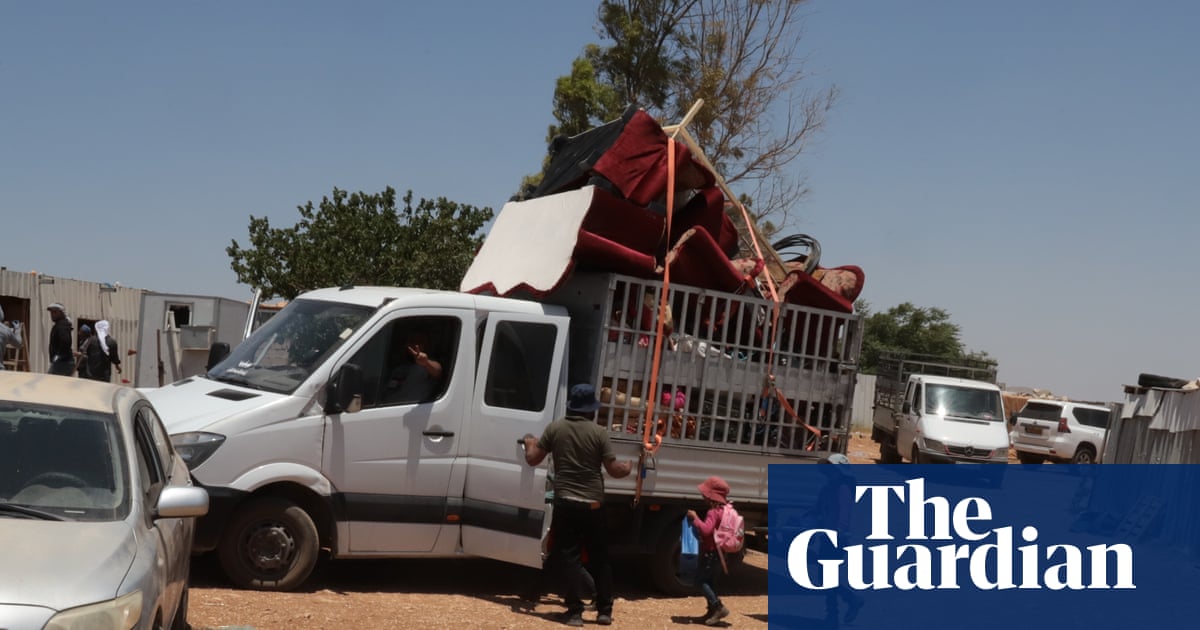Violent Israeli settlers including two under UK sanctions have forced about 150 Palestinians to leave their village in the occupied West Bank, through a five-dayintimidation campaigncarried out under the watch of the Israeli police and army.
On Sunday morning, settlers established an illegal outpost, consisting of a basic shelter and a sheep pen, 100 metres from a Palestinian home in Mughayyir al-Deir, east of Ramallah. By Friday, dozens of villagers had already moved their flocks away, packed up their belongings and were dismantling the wooden and metal frames of their houses.
Settlers stalked between Palestinian men who worked fast and largely in silence, grappling with the grim reality of leaving the place where most were born and grew up. A child cried as he was driven away on a truck loaded with the family’s red sofas.
“We are all leaving,” said one villager, who asked not to be named. Settlers threw stones at some trucks as they left, and celebrated on social media.
Elisha Yered, an unofficial spokesperson for the extremist group Hilltop Youth, wrote: “This is what redemption looks like! This is a relatively large outpost that contained about 150 people from the enemy population, but it was broken.”
Yered is subject to sanctions from the UK and the EU, which said he was “part of a group of armed settlers” involved in an attack in 2023 that led to the death of a 19-year-old Palestinian, Qusai Jammal Mi’tan.
Two other settlers under UK sanctions, Neria Ben Pazi and Zohar Sabah, spent time at the illegal outpost this week, and Ben Pazi also worked on building a fence around Palestinian land.
Other Bedouin came to help villagers pack up and leave, including some who understood their fear and pain intimately because violent Israeli settlers had also driven them off the land.
The tactics used by the settlers this week were not new. The nearby hills are dotted with the ruins of abandoned villages, at least one, Wadi as-Seeq, also targeted by the UK-sanctioned Ben Pazi.
Settlers had never before built an outpost so close to Palestinian homes and the speed and intensity of the campaign in Mughayyir al-Deir was a sign of their growing confidence, activists said.
Police patrolled through the village on Friday and Israeli soldiers stood nearby. None intervened, although a “stop work” order had been issued for the illegal outpost after it was thrown up, and several settlers who spent time at it were also known to Israeli authorities for extreme violence.
A previous Israeli commander for the central region, Maj Gen Yehuda Fuchs, tried in 2023 to bar Ben Pazi from theWest Bankover violent attacks on Palestinians.
The only other official Israeli visitor during the week was a far-right member of the Knesset, Zvi Sukkot, who came to back the settlers. Last week, Sukkot said in a TV debate that Israel “can kill 100 Gazans in one night during a war and nobody in the world cares”.
One Palestinian family filed a petition with Israel’s supreme court on Thursday demanding an injunction and urgent hearing into why the military, police and local authorities did not act to prevent the forced evictions and protect Palestinians.
A spokesperson for the Israeli military said troops operated “to ensure the security of the state of Israel and Judea and Samaria [Israel’s name for the occupied West Bank]”, and the government directs how the military should enforce orders about illegal construction.
The military would respond to the legal petition in court, the spokesperson said. A hearing is scheduled for next week, although by the time judges hear it the village will be empty.
For many of the families forced out, their move on Friday was a second displacement at the hands of Israelis, as their parents and grandparents had been forced from land near the Israeli city of Be’er Sheva when the state was formed in 1948.
